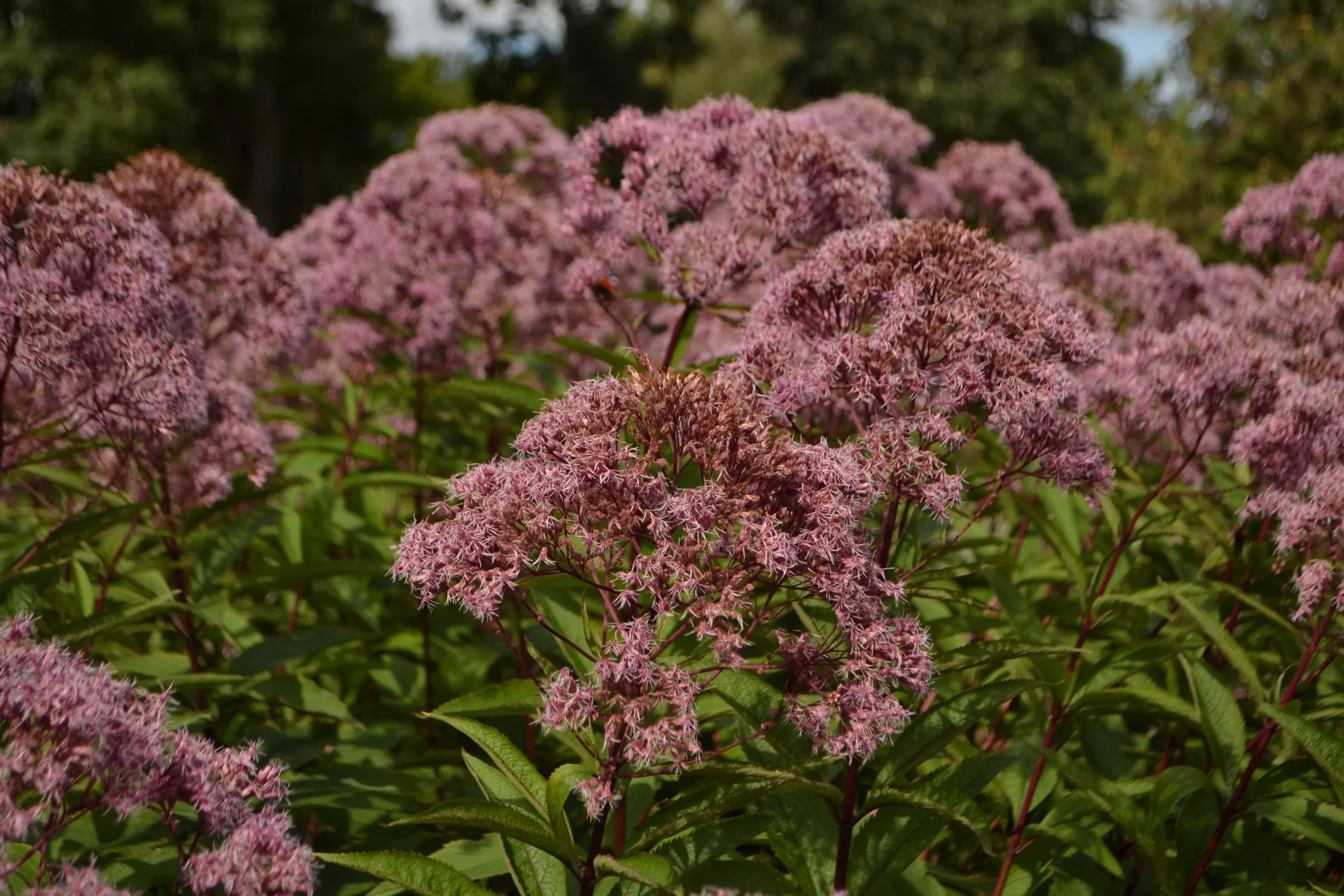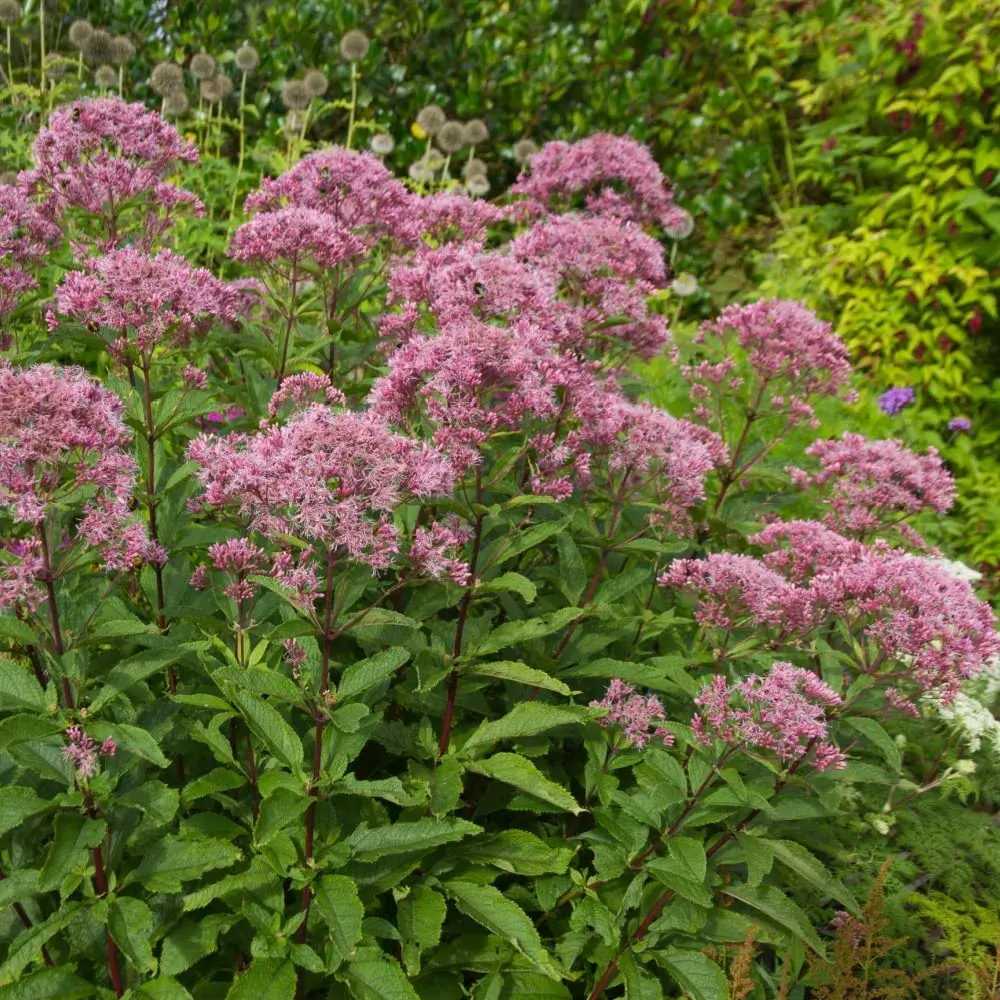Family: Joe Pye Weed
Type: Perennial
Other Common Name: Gravel Root, Kidney Root, Purple Boneset

Joe Pye Weed, or Eutrochium, is a striking perennial native to North America. It’s known for its tall stature and fluffy, pinkish-purple flowers.
This plant blooms in late summer, offering a spectacular display that lasts into fall. Its large flower clusters are highly attractive to butterflies and bees.
Joe Pye Weed is not only a garden favorite but also a valuable plant for naturalistic and wildlife gardens. It’s easy to grow and requires minimal care, making it a popular choice for many gardeners.
Hardiness Zone: 2b-4a
Deer Resistant: Yes
Pet Friendly: Yes
Moisture Preference: Average to wet
Sun Needs: Full sun to partial shade
Growth Rate: Medium
Average Height (feet): 8
Average Spread (feet): 4
Average Life Span (years): 15
Form: Upright spreading
Flower Color: Purple
Bloom Season: From mid summer to early fall
Foliage Color: Green
Foliage Shape: Narrow
Incorporating Joe Pye Weed into your garden adds height and a wild, natural look. It’s perfect for creating a meadow-like or prairie-style landscape.
These plants work well at the back of borders or in large, informal groupings. Their tall, striking appearance makes them a focal point in any garden setting.
Use them to attract butterflies and bees. Their nectar-rich flowers make them a fantastic addition to any pollinator garden.

Joe Pye Weed is perfect for a meadow-style garden. Its natural habit and tall, billowing flowers contribute to the wild, open feel of a meadow landscape.
In cottage gardens, Joe Pye Weed adds height and an element of whimsy. Its tall flowers blend well with the relaxed, informal style of a cottage garden.
Ideal for wildlife gardens, Joe Pye Weed attracts butterflies, bees, and birds. Its flowers provide nectar, while its structure offers shelter and nesting opportunities.
Plant in groups for a dramatic effect. Masses of Joe Pye Weed create a stunning display of color and texture.
Combine with other late-blooming perennials. This extends the color and interest in your garden through the fall.
Plant near a water feature or in a rain garden. Joe Pye Weed thrives in moist conditions, making it ideal for these environments.
Select our pre-made garden layouts to create a landscape that’s uniquely yours. Simple, smart, and customizable!
In spring, Joe Pye Weed starts as a low mound of foliage. The leaves begin to unfurl, setting the stage for the growth spurt that comes later in the season.
By mid to late summer, Joe Pye Weed is in full bloom. The plant reaches its maximum height, adorned with clusters of pinkish-purple flowers.
In the fall, the flowers of Joe Pye Weed may fade, but the plant remains structurally interesting. Its seed heads can provide food for birds.
During winter, Joe Pye Weed dies back to the ground. The dead stems can be left for winter interest and habitat or cut back to tidy the garden.
Joe Pye Weed thrives in full sun to partial shade. It prefers a spot that gets several hours of sunlight daily, but it can also tolerate light shade, especially in hot climates.
Optimal growth and flowering occur in full sun, but Joe Pye Weed can also prosper in partial shade. In hotter regions, some afternoon shade is beneficial.
This plant is adaptable to a range of soil types but prefers moist, well-drained soil. It's particularly tolerant of wet soils, making it suitable for rain gardens.
Space plants about 2 to 3 feet apart. Joe Pye Weed can grow quite tall and wide, so adequate spacing is crucial for air circulation and to prevent overcrowding.
The best time to plant Joe Pye Weed is in the spring or early fall. Planting in cooler weather allows the roots to establish before the extremes of summer or winter.
Plant at the same depth it was in the container. Water well after planting and consider adding a layer of mulch to conserve moisture and suppress weeds.
Joe Pye Weed likes moist soil, so regular watering is important, especially in dry conditions. However, it’s also quite drought-tolerant once established.
Fertilize lightly in the spring, if at all. Joe Pye Weed doesn’t require much feeding and can thrive in poor soil conditions.
Deadheading is not necessary but can be done to maintain a neat appearance. Cut the plant back to the ground in late winter or early spring before new growth starts.
In spring, clear away any dead stalks and apply a thin layer of compost or a balanced fertilizer to encourage vigorous new growth.
Water regularly, especially during dry spells. Keep an eye out for pests or diseases, though Joe Pye Weed is generally quite hardy.
In fall, you can leave the seed heads for winter interest and to provide food for birds. Reduce watering as the plant starts to go dormant.
In winter, Joe Pye Weed is dormant. If you haven't cut back the plant in fall, you can do so in late winter. Mulching can help protect the roots in colder climates.
Joe Pye Weed can reach heights of 4 to 7 feet, depending on the variety and growing conditions.
While Joe Pye Weed is a vigorous grower, it is not generally considered invasive. However, it can spread in ideal growing conditions.
Yes, it can be grown in large containers, but due to its size, it’s best suited for garden beds where it has room to spread.
Sign up below to get exclusive deals, discounts, and new plant collections—delivered straight to your inbox! Plus, stay inspired with the latest gardening tips, landscaping trends, and DIY garden ideas. Start growing with us today!
A big thank you for subscribing to the PBN Design newsletter.
We're thrilled to have you join our community. Get ready for exciting updates, insightful content, and more delivered straight to your inbox.
Stay tuned!
Go backA big thank you for subscribing to the PBN Design newsletter.
We're thrilled to have you join our community. Get ready for exciting updates, insightful content, and more delivered straight to your inbox.
Stay tuned!
Go back